| Shepherds of Christ Daily Writing |
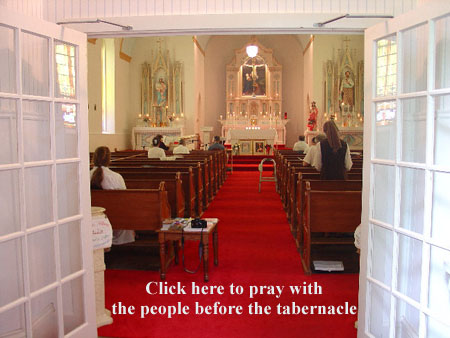 |
August 15, 2018
|
August 16th Holy Spirit Novena |
The Novena Rosary
Mysteries |
Please pray for a special intention.
Pray for Matt, pray for funds & grace.
Pray for Matthew, Malcolm & Betty.
Please pray for Dan, Jim,
Blue Books,
Prayer Chapters,
all intentions.
Please pray for Dennis serving our country.
Please pray Fr. Joe's book & cover & all involved.
Prayer for Grace for our Country
Dear Father united to Jesus in the Holy Sacrifice of the Mass, the Sacrifice of Calvary sacramentally made present, celebrated around the world, in the Holy Spirit. We offer up all we do united to the Mass. We unite in one mind and one heart as members of the mystical body of Christ, with Christ our head in the pure and holy Hearts of Jesus and Mary, through the powerful intercession of Mary with all the angels and saints and souls in purgatory, and we beg for the saving grace, for our country, the United States. Please help us. We further pray for unity to always do the will of God in love. We spread the Blood of Jesus on the leaders and people of the United States and cast the devil into hell. We consecrate our country to the Sacred Heart and Immaculate Heart and all our dioceses, and beg for an outpouring of the Holy Spirit. God help us. We pray for our families, the priests, the Church and the world. In the Name of Jesus please hear us, we pray. We pray for our president and leaders. We pray that we are united as one nation under God to work together in love as God wants.
August 15, 2018
R. Fr. Carter says
"Through the life of grace Christ
is meant to take deeper and deeper
possession of each of us. Mary
and the Holy Spirit continually labor to
achieve this."
We are to grow more and more
into the full stature of Christ.
Mary wants to form Christ in us.
We are body and soul. We
unite to the Mass and we offer
the Holy Sacrifice of the Mass
to the Father in the Holy Spirit with
all the angels and saints and
souls in purgatory through the
intercession of Mary our Mother.
We offer exteriorly what we
want to offer interiorly in our
hearts. Our great love uniting
to God is an interior union –
We love God deeply in our hearts –
St. Augustine says
"A visible sacrifice, therefore, is
a sacrament or sacred sign
of an invisible sacrifice"
We have interior acts of
LOVE, ADORATION, THANKSGIVING,
REPARATION and PETITION.
The interior gift of ourselves.
At Mass we give ourselves to
God – our all – We unite to Christ
and offer ourselves in Christ
to the Father, in the Holy Spirit with
all the angels and saints and the
souls in purgatory and Mary
intercedes as she did on Calvary.
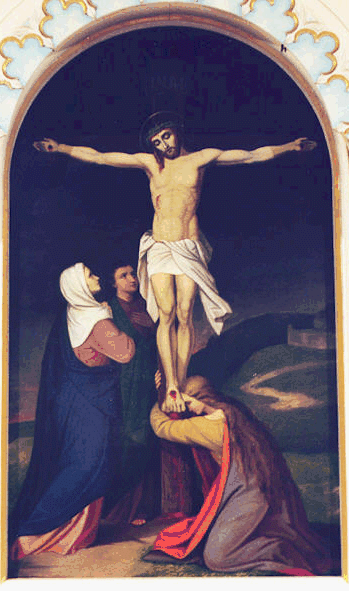
R.
Jesus is the Lamb of God –
The Mass is the sacrifice of
Calvary – sacramentally made present –
The interior offering is in union
with others – the members of
the mystical body of Christ –
In this sacrifice is the
sacrificial Blood – to purify –
from sin – to be made holy –
Atonement for sins –
Deeper union with God –
We eat His Body, we drink His
Blood –
The shedding of Blood in sacrifice
in the past was to purify and unite
deeply to God – This was the role
of sacrifice in the past.
The sacrifice comes from a
pure and humble heart – offering
sacrifice to God – There is the
acceptance of sacrifice
CHRIST'S SACRIFICE
The Mass is the sacrifice of
Calvary – sacramentally made
present –
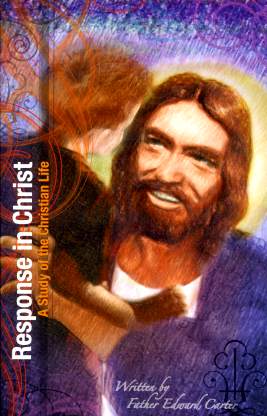
From Response in Christ
by Fr. Edward J. Carter, S.J.FOUR The Sacraments and the Mass
(excerpt)1) The Interior offering of Our Lord
The sacrifice which Christ offered for the redemption of the world was first and foremost an interior moral act. Christ's life possessed its great value because of His interior dispositions. His entire life was a constant gift of Himself in love to the Father and to mankind, and Calvary was the supreme expression of this gift. This gift of self was regulated by a perfect conformity to His Father's will.
Christ not only was constantly living out this interior disposition of sacrifice, but He strove to inculcate the necessity of it in the Jews of His time. He constantly opposed a false and legalistic concentration on the mere externals of Jewish purifications, for such an attitude tended to diminish the necessary internal dispositions. The synoptic theology of sacrifice stresses this attitude of Christ. Bernard Cooke states: "This insistence of Jesus on internal dispositions characterizes the Synoptic theology of sacrifice, which continues and completes the prophetic emphasis on the moral and individual aspect of sacrifice. . . . One must be careful, however, not to exaggerate the opposition (either in the prophets or in the Synoptic Gospels) between cult and internal dispositions of soul."13
2) Ritual Oblation
As we have said, man, because of his corporeal and social nature, has always desired to express the interior oblation of sacrifice in an external, ritual oblation. So it was with Christ. Unlike the dualists, who maintain that Christ's interior offering was sufficiently exteriorized during the passion itself, the unicists maintain that the only place where we can locate a ritual oblation is at the Last Supper. This ritual oblation cannot be found in any other phase of Christ's sacrifice – from the Garden to the Cross – despite the efforts of some to do so. Notice, too, that in the case of Christ's sacrifice, the ritual oblation of the Last Supper is of a victim-to-be-immolated rather than of a victim already immolated.
Christ's ritual oblation at the Last Supper possessed a many-faceted signification. We will comment on several aspects. We begin by recalling the social implications of the ritual oblation. This social element is present in Christ's actions at the Supper. He told the Apostles to do what He was doing in commemoration of Him. This would assure that in the future the head and members of the Church would sacramentally renew Christ's redemptive, sacrificial act. In this manner the members of Christ's Body would not passively receive the graces of Christ's sacrifice, but rather would assimilate these graces by actively entering into Christ's act of atonement. Consequently, Christ's sacrifice, in its perennial, sacramental renewal down through the ages, was to be of a social, corporate nature.
Closely related to this social aspect of Christ's actions were the covenant significations of the Last Supper ritual. This is brought out by observing the connection of Christ's actions with two of the chief types of Jewish sacrifices we have previously mentioned, the sacrifice of the pasch and that of covenant. In both of these the concept of sacrificial blood enters in.
The Last Supper was a paschal meal, or at least had a paschal significance. The Jewish paschal meal commemorated the Jewish people's delivery from Egyptian slavery, which, in turn, symbolized their deliverance from sin. The enslaved Jews had been freed from Egyptian tyranny with the aid of the blood of the paschal lamb. For this blood, we recall, had exempted Jewish homes from the visit of the exterminating angel. How fitting, then, that at the paschal supper Christ instituted the eucharist in which His blood is sacramentally shed. He is the new paschal lamb whose blood frees us not from Egyptian slavery but from slavery to sin. The old pasch, a covenant communion between Yahweh and His chosen people whom He delivered from Egypt, gives way to the new pasch, the new covenant communion between God and His people.
These ideas concerning covenant lead us to a consideration of the second type of Jewish sacrifice linked with Christ's actions at the Last Supper. We recall that in the sacrifice of the covenant Moses sprinkled sacrificial blood on both the altar representing Yahweh and the people. This blood, considered to be source of life, united Yahweh and His people in a union, a common life, or, in other words, a covenant. We understand, consequently, the deep significance of Christ's words at the Last Supper when He referred to His blood as being that of the new covenant. This is the blood which establishes between God and men a new union, a new covenant.
3) Immolation of the Victim
The central importance of Christ's sacrificial blood is evident. It is the blood of the new paschal lamb. It is the blood of the new covenant, the blood which redeems man. The shedding of this blood occurred during the immolation of Christ's passion-death. Schillebeeckx points out the significance of this immolation in blood: "The Blood of Christ is a theme that is truly central in the primitive Church, as Scripture shows it to us. This death sanctifies mankind, reconciles, establishes peace, redeems, constitutes the Church, and therefore unites man in communion with God and his fellow men. We are redeemed in sanguine, through the blood of Christ – this we find on almost every page of Scripture. It is impossible therefore to spiritualize Christ's sacrifice, to make it merely an internal act of love. There was indeed the act of love, but it was embodied in the sacrifice of blood."14
At this point we also note the profound unity of Christ's sacrifice. We observe that priest and victim are one and the same. At the Last Supper, Christ is chiefly priest; on Calvary, He is chiefly victim. Yet He is always priest and victim. Christ does not perform the immolation. He rather endures it. However, this is sufficient since it is not necessary for the priest of the sacrifice to achieve the immolation himself.
4) The Father's Acceptance of Christ's Sacrifice
We have demonstrated that one of the constituent elements of sacrifice is its acceptance by God. In the case of Christ's sacrifice, this acceptance by the Father was accomplished in a most glorious fashion – through Christ's Resurrection and Ascension. The Father glorified His Son for the perfect, whole-hearted sacrifice of Calvary. This glorification shall endure for all eternity, since Christ reigns at the right hand of the Father as eternal victim, as eternal, glorified victim. Through this glorified Christ the treasures of His sacrifice are distributed to all men: "Christ's glorification is the mystery whereby the treasures of his divinity flow to us, through the opening of his mortal life."15
In the union of these last two elements of Christ's sacrifice, His immolation in death and the acceptance of His sacrifice through the Resurrection and Ascension, lies the essence of Christ's redemptive act – of course, in saying this we presuppose the first element of Christ's sacrifice, His interior disposition or oblation; this is the essential element. This union of Christ's death and Resurrection is called His paschal mystery, His passover. In what did this passover or transition consist? In our initial chapter we briefly described this passover of Christ. We will now expand to some extent upon this basic reality of Christ's life.
The divine love, or agape, descended into this world for the salvation of men. This saving force manifested itself to men through the redemptive activity of the Word made flesh. By becoming man, Christ, although free from sin, submitted Himself to the conditions and circumstances of a sinful world. His redemptive activity consisted in a struggle with the forces of evil. As this struggle developed, Christ at the same time was returning to the glory of His Father. He finally conquered completely through His paschal mystery. Through His death He liberated Himself completely from a world impregnated with sin and passed over into the new order of the Resurrection. Moreover, Christ experienced this transition process not just for Himself. By His own passover Christ achieved for all men the opportunity to pass from death to life, from a life of sin to a new life as sons of God. In the words of Lyonnet, "The redemption is essentially the return of humanity to God. The return is accomplished first of all in Christ who died and rose again as the first fruits of this humanity (objective redemption), and then in each Christian who dies and rises again with Christ in baptism (subjective redemption)."16
Consequently, we have observed, in terms of sacrificial elements, the most intimate union which exists between Christ's death and Resurrection. They are inseparable, and lie at the heart of the total mystery of Christ. This paschal mystery is central, therefore, to the liturgy and to the whole Christian life.
5) The Banquet in Christ's Sacrifice
The cycle of sacrifice is strikingly completed by God graciously extending an invitation to partake of the offered victim. This element of sacrifice is miraculously fulfilled in Christ's oblation. By the words of consecration the bread and wine become Christ. In this manner Christ gives Himself to His disciples at the Last Supper. We will further develop these ideas of eucharistic communion in our consideration of the Mass.
We hereby complete the consideration of the elements of Christ's sacrifice. According to the unicists there was but one sacrifice of Christ. The Last Supper, death and Resurrection each contributed essential elements. This one sacrifice of Christ endures in its efficacy for all time. In itself it is not to be repeated. Its sacramental renewal, however, is repeated daily on our altars in the Mass.c) The Sacrifice of the Mass
Some contemporary authors, while not necessarily de-emphasizing the sacrificial nature of the Mass, are giving a renewed emphasis to the concept of the Mass as banquet or meal. This is all to the good, as long as the sacrificial structure is not allowed to recede to the background. In this regard it is well for us to recall the mind of the early Church. Jungmann says: "The first centuries of Christianity, which had built the framework for the celebration of the Eucharist which is still followed today, had laid down two basic thoughts: The Mass is the memorial of the Lord, and it is the sacrifice of the Church. These two thoughts are expressed just as clearly and simply today: '. . . calling to mind the blessed passion – we offer to your sovereign majesty – this pure sacrifice.' "17
We should always unite the concepts of the Mass as sacrifice and the Mass as meal by realizing that the eucharistic meal is an integral part of the sacrifice. It is its conclusion.
We should also be aware that the Mass is a covenant sacrifice. It is the sacramental renewal of Christ's covenant sacrifice. The Mass is the central act of our covenant life in Christ, and therefore it embraces the four great dimensions of covenant love. In Christ, by the action of the Holy Spirit, we open ourselves in a special manner during the eucharistic liturgy to the Father's love and we respond to that love. In Christ and His Spirit we also pledge ourselves at Mass to go out in a deeper love to the members of the People of God and to all men. We also commit ourselves anew to be open in receiving the love of others. According to these various perspectives, the Mass above all is an action of love.
1) Interior Oblation of the MassThe chief priest and victim of the Mass is the same as the priest and victim of the Last Supper and Calvary, Christ Himself. Christ makes this interior offering of Himself in the Mass for the same ends as were present in His own unique sacrifice – adoration, thanksgiving, petition and satisfaction.
However, Christ is not the only priest at the Mass as He was at the Last Supper and upon Calvary. All the members of the Mystical Body are priests along with Christ. To be sure, there is a difference between the hierarchical priesthood of bishops and priests and the universal priesthood of the faithful. This difference is one of essence and not merely degree. The point we wish to stress, however, is that the universal priesthood is a real participation in Christ's priesthood given through the sacraments of baptism and confirmation.
This concept of the priesthood of all the Church's members is being stressed today in a special manner.18 Jungmann, the outstanding liturgical theologian, gives us reasons why this concept of universal priesthood became relatively obscure for so many years. He states that the concept of the Mass as the Church's sacrifice faded into the background as a result of the Reformation. The Reformers maintained that there was only one sacrifice, the one which Christ offered upon Calvary. To counteract this heresy the Council of Trent and the theology consequent to it had to clarify that the Mass is a true sacrifice, but not an absolutely independent one. It is a sacrifice relative to the absolute one of Calvary and a representation of it. It was emphasized that the priest of Calvary is also the chief priest of the Mass. Because of such doctrinal controversies, the concept that Christ offers the Mass was alone considered important. The concept that the Mass is also the sacrifice of the Church practically disappeared. Finally, Jungmann notes that today we are returning to the balanced view which meaningfully recognizes that the Mass is not only the sacrifice of Christ, but also that of the Church.19 This stress on the Church's part in the Mass is logically connected with the contemporary emphasis on the priesthood of all the members of the People of God.
As Christ is not the only priest of the Mass, neither is He the only victim. Again, all the members of the Church are victims along with Christ. Various Church documents attest to this. For instance, Pope Paul VI officially calls attention to this: "It is a pleasure to add another point particularly conducive to shed light on the mystery of the Church, that it is the whole Church which, in union with Christ functioning as Priest and Victim, offers the Sacrifice of the Mass and is offered in it."20 Therefore, the members of the People of God, united as priests to Christ the high priest, offer a combined victim to the Father: Christ and themselves. Such then in all its deep meaning and beauty is the first sacrificial element of the Mass.
2) Ritual Oblation of the MassJust as Christ's interior offering of Himself was externalized in a ritual oblation at the Last Supper, so is there an external, liturgical rite of the Mass. The importance of this many-faceted exteriorization is brought out by Vatican II's Constitution on the Liturgy.
As mentioned before, this exteriorization of the internal oblation is according to man's social and corporeal nature. That it is in harmony with the social part of man is evident from the fact that the external rite assembles the People of God to worship together as a community. The individual members are consequently enabled to help one another to achieve the proper worship of God. The Constitution gives stress to this social aspect of the liturgy. It states that the very nature of the liturgy demands that all the faithful be led to a full and active liturgical participation. Such is in keeping with their vocation as "a chosen race, a royal priesthood, a consecrated nation" (1 P 2:9). The Constitution emphatically states that such full and active participation on the part of all the people is the chief aim of the liturgical renewal.21
As also previously observed, the external rite is likewise according to man's bodily nature. In the case of the Mass (and the sacraments also) we observe that the very validity of the sacrifice depends on having the proper materials for the offering – bread and wine – and on the use of the proper form of consecration. The external, the ritual, the sensible, are indeed indispensable.
In all this we note the great law of incarnation. The Incarnation established a set pattern for the redemption of the world, redemption taken both objectively and subjectively. Christ redeemed the world through His sacred humanity. This humanity is, then, the gateway to the divinity, to eternal life.
As Christ's created humanity was indispensable for accomplishing the sacrifice of the objective redemption, so are created things necessary for the eucharistic sacrifice of the subjective redemption. This fact calls to mind the thought of Teilhard de Chardin. Teilhard holds a world concept in which all things, natural and supernatural, spiritual and material, are united in a single and organic unity. The pole of this unity is the person of the Incarnate Word, towards whom the whole of creation converges.22 In such a concept the law of incarnation is developed to the utmost, a fact brought out by the following words of Teilhard: "Let us remember that the supernatural nourishes itself on everything."23
At various times in the history of Christian spirituality, the Church has been plagued with an exaggerated spiritualism rising out of various sources. Such a spiritualism, looking upon material things as more of a hindrance than a help, is foreign to the true Christian spirit. A true theology of the Incarnation, a theology which the Church so well concretizes in her liturgy, can lead to no other conclusion.
It is no accident that a meaningful incarnation spirituality is developing concomitant with the liturgical renewal. Although we would not want to say that the incarnational element outweighs the transcendent element in the Church's portrayal of the Christian life, yet she is leading the faithful of all vocations to a deeper incarnationalism. The Church is accomplishing this through a variety of ways. She is achieving this incarnationalism, for instance, through the great social encyclicals, through the documents of Vatican II, and, in reference to our present topic, through a revived liturgy.
There is a deep significance, and a rich world of thought connected with the second sacrificial element of the Mass: the ritual oblation which incarnates the interior oblation.
3) Immolation of the VictimChrist, the chief victim of the Mass, has been immolated once and for all in the offering of His own unique sacrifice. And yet, since the Mass is a true sacrifice in its own right, we logically look for an unbloody immolation of Christ the victim. Where do we find this immolation? Traditionally it has been seen to be present in the double consecration of bread and wine. This double consecration symbolizes the separation of Christ's blood from His body, and, consequently, symbolizes His death. Pius XII's encyclical, Mediator Dei, states: "Thus the commemorative representation of His death, which actually took place on Calvary, is repeated in every Sacrifice of the altar, seeing that Jesus Christ is symbolically shown by separate symbols to be in a state of victimhood."24 Jungmann reminds us of the importance of this sacramental immolation of Christ. While admitting and even stressing the importance of giving the "meal symbolism" its proper place in the Mass, Jungmann calls for a priority of sacrificial symbolism: "It is quite another question whether or not it is necessary or even correct to regard the meal symbolism as the decisive and fundamental thing in the outward transaction of the Mass. If the Mass is a sacrifice then this must find appropriate expression in the outward picture too; for sacrifice is essentially a demonstrative action, the symbolic representation of inward readiness to give oneself."25
Durrwell, a biblical theologian, also highlights the importance of the Mass's immolation. He seems to say that Christ's immolation is symbolized by the very words of consecration. He says that the Last Supper and its commemoration, the Mass, are sacrificial meals. Consequently, ". . . Christ appears in the victim state. He gives them to drink "the blood of the new covenant, shed for many' (Matt, Mark), blood of sacrifice as the establishment of the old covenant required (Exod xxiv, 8) shed at the moment of drinking."26
However, as we have said, Christ is not the only victim of the eucharistic sacrifice. The members of His Body, the Church, are also victims along with Christ. Those members must also be in a state of victimhood. As with Christ, they cannot undergo a bloody immolation. Their immolation must also be a mystical one. How is this accomplished? We can look to two passages of the encyclical Mediator Dei for thoughts on such a mystical immolation. In one passage we read that pride, anger, impurity and all evil desires are to be mystically slain. As the Christian stands before the altar, he should bring with him a transformed heart, purified as much as possible from all trace of sin.27 Positively considered, such a transformation means that the Christian is striving to grow in the supernatural life by all possible means, so as to present himself always as an acceptable victim to the heavenly Father.
In another passage of the same encyclical this mystical immolation of Christ's members is further developed. To be a victim with Christ means that the Christian must follow the gospel teaching concerning self-denial, that he detest his sins and make satisfaction for them. In brief, the Christian's victimhood means that he experiences a mystical crucifixion so as to make applicable to his own life the words of St. Paul, "I have been crucified with Christ. . ." (Ga 2:19).28
Jungmann has a beautiful passage concerning the Christian's eucharistic immolation. He states: "Every sacrament serves to develop in us the image of Christ according to a specified pattern which the sacramental sign indicates. Here the pattern is plainly shown in the double formation of the Eucharist; we are to take part in His dying, and through His dying are to merit a share in His life. What we here find anchored fast in the deepest center of the Mass-sacrifice is nothing else than the ideal of moral conduct to which the teaching of Christ in the Gospel soars; the challenge to an imitation of Him that does not shrink at sight of the Cross; a following after Him that is ready to lose its life in order to win it; the challenge to follow Him even, if need be, in His agony of suffering and His path of death, which are here in this mystery so manifestly set before us."29
Summarily, then, we become victims with Christ by lovingly conforming our wills to the Father's will in all things. Such conformity was the essence of Christ's sacrifice, of His victimhood, and of His immolation. A similar conformity must be in the victimhood and the immolation of Christ's members. This mystical immolation is a lifelong process. The ideal is that each Mass participated in by the Christian should mark a growth in his victimhood. The true Christian desires to die more and more to all which is not according to God's will so that he may become an ever more perfect victim with Christ.
4) The Father's Acceptance of the Eucharistic SacrificeIt has been observed that if sacrifice is to have its desired effect, it must be accepted by God. That the Father always accepts the eucharistic sacrifice is certain. For the principal priest and victim is Christ Himself, always supremely acceptable to the Father. As for the subordinate priests and victims, they are, taken together, the People of God, the Church herself.
There is always an acceptance on the Father's part even as regards this subordinate priesthood and victimhood of the Mass. For even though the Mass may be offered through the sacrilegious hands of an unworthy priest, there is always a basic holiness in the Church pleasing to God. Because of such holiness the Father always accepts the Church's sacrificial offering, for the Mass is the sacrifice of the whole Church, and cannot be fundamentally vitiated by the unworthiness of any particular member or members, even if that member be the officiating priest.
What do we say concerning the Father's acceptance of the sacrificial offering of the individual Christian? Such an offering will be acceptable in proportion to the Christian's loving conformity of will to the Father's will. Speaking of the Christian's participation in the Mass, Jungmann says: "It follows that an interior immolation is required of the participants, at least to the extent of readiness to obey the law of God in its seriously obligatory commandments, unless this participation is to be nothing more than an outward appearance."30
Having considered in successive sections the immolation and acceptance elements of the Mass, we should consider the vital link between these two. For just as the two are inseparably connected in Christ's sacrifice, so are they also united in the Church's sacrifice of the Mass.
In Christ we equated the immolation of His sacrifice with His passion-death, and the acceptance element with His Resurrection. Uniting these two mysteries of death-resurrection, we spoke of Christ's paschal mystery. We have seen that this mystery had been prefigured by the Jewish pasch and exodus, component parts of the Jewish people's transition to a new and more perfect life. In the case of Christ, we considered His pasch – His passover – to be a transition from the limitations of His mortal life to the state of resurrected glory. We speak of Christ's mortal humanity as having exercised limitations upon Him in this sense, that, although He Himself was completely free from sin, He had exposed Himself to the conditions of a sin-laden world through His human nature. In His death-resurrection He changed all this as He conquered sin, as He redeemed us, as He passed to the state of glory with His Father.
What happened in Christ also occurs in His Mystical Body, the Church. The Church and Her members experience their own transition from death to resurrection. The entire Church and the individual Christian express, through the Mass, a willingness to grow in the participation in Christ's death. The Father accepts this willingness and gives an increase in the grace-life, a greater share in Christ's Resurrection. This process happened within a short span of time in Christ's life. In the life of the Church it continually takes place until Christ's second coming. The Church, with her grace-life of holiness, has already partially achieved her resurrection, but not completely, even though she continues to grow in grace. St. Paul bears witness to this: ". . . but all of us who possess the first-fruits of the Spirit, we too groan inwardly as we wait for our bodies to be set free." (Rm 8:23).
Vatican II's Constitution on the Church beautifully portrays this fused state of death-resurrection which the Church in her members experiences here below as she awaits the fullness of the resurrection in the world to come: "For this reason we, who have been made to conform with him, who have died with him and risen with him, are taken up into the mysteries of his life, until we will reign together with him. . . While still pilgrims on earth, tracing in trial and in oppression the paths he trod, we are anointed with his sufferings as the body is with the head, suffering with him, that with him we may be glorified. . ."31
5) Partaking of the Eucharistic MealThe cycle of the eucharistic sacrifice is completed as the priest and faithful partake of Christ the paschal lamb. The People of God have given Christ to the Father. Now the Father gives Christ to the Church's members in the eucharistic meal. Although the priest alone must communicate to assure the integrity of the sacrifice, it is highly desirable, of course, that all present partake of the eucharist.
In the sacrifices of old, the victim of the sacrificial banquet was considered in some sense divine by the fact that it had been offered to the divinity. In the sacrifice of the new covenant we receive divinity itself through the sacred humanity. With such a marvelous conclusion to the eucharistic sacrifice, the fruits of Christ's sacrifice of Calvary are continually experienced.
There are other truths to be considered under the paschal meal aspect of the Mass. One of these is the concept of the eucharist as sign and cause of unity. Von Hildebrand comments on this: "All receive the one body of the Lord, all are assimilated into the one Lord. Even if we leave aside the supreme ontological supernatural unity which is realized here, the very act of undergoing this experience represents an incomparable communion-forming power."32
Through the sharing of the one paschal lamb, the Christian assembly has thus been vividly reminded of their oneness in Christ. Yet this is a oneness in plurality. For each Christian is a member of the one Body of Christ in his own unique way. He has been called upon to assimilate Christ according to his own personality, vocation and graces. Consequently, just as the members of the People of God are reminded of their unity at Mass, so are they made aware of their own uniqueness as they depart from the eucharistic assembly, each carrying Christ to his own particular environment according to his own individual personality.
We have considered the Church's eucharistic sharing in the mystery of Christ according to a sacrificial structure. With the general structure of the Mass established, we will now enlarge upon the concept of the participation of the individual.
d) The Christian's Participation in the Mass
God has created man a social being. This fact has relevance as regards man's salvation and perfection. Man does not go to God alone, but rather is saved and perfected with and through others. This is evident in the study of salvation history as one observes God communicating Himself to man in the framework of community. As we have seen, this social dimension is also readily evident in the liturgy.
As we now discuss the individual's participation in the liturgy, we in no way intend to underestimate the communal aspect of the eucharistic sacrifice. We constantly presuppose it and its importance. Liturgy as communal is the indispensable framework and background for any discussion of the individual's liturgical participation.
Granted all this, it is still useful and necessary to speak of the individual's participation in the Mass.33 Ultimately it is the individual as individual who accepts or rejects God's offer of salvation and sanctification. Therefore, to speak of the individual's response to God in the liturgy is highly significant. Despite all the communal helps the individual receives in the liturgy, despite the fact that the individual must always be deeply aware that he is a member of the community, the People of God, it is still true to say that it is within the depths of his own mysterious, individual personality that the Christian either becomes a mature Christian through the liturgy or fails to do so. With such preliminary ideas established, let us now consider the Christian and his role in the Mass.
1) The Baptized Christian and the MassOnce again the reader is reminded that through baptism the Christian becomes incorporated into Christ and His Church. Confirmation perfects this incorporation. Although baptism incorporates us primarily into Christ's death and Resurrection, we again stress that it also unites us with Christ in all His mysteries. This is so because all Christ's mysteries are essentially one mystery, for none of them stands separately by itself. Consequently, one cannot be initiated into Christ's paschal mystery without simultaneously being incorporated into all of His mysteries.
The fact that all of Christ's various mysteries are contained in the total mystery of Christ enables the Christian to encounter the entire Christ in the liturgy. Mention of this fact brings us to our next point.
In baptism the Christian first encounters and relives the mystery of Christ. He thereby receives a new life. But this life must be nourished. The Christian must constantly re-encounter the mystery of Christ, and this he does chiefly through the eucharistic liturgy. Here the Christian is daily privileged to encounter Christ in the most intimate fashion. Here above all he exercises his priesthood and consequently grows in supernatural vitality. We use the word exercise purposely, since the liturgy is primarily an action, an exercise of the priestly office of Christ.
Since the baptized Christian is sacramentally participating in the mystery of Christ at the Mass, his priestly act must be modeled after that of Christ's. This is true because the life of grace flowing out of the seals of baptism and confirmation is structured according to certain modalities or characteristics based on the life of Christ. This truth was developed at some length in the previous chapter. There we stated that Christ, the head of the Mystical Body, has determined, through His own life of sanctifying grace, the general lines of development according to which His members' lives of grace grow and mature.
Therefore it is evident that the whole of the Christian's life must be orientated to the Mass and be centered about it; for in Christ we see His entire life centered around His priestly act of Calvary. This is true because His interior sacrificial disposition, the essence of His priestly act, permeated everything in His life.
The baptized Christian should also bring his daily life, his whole life, to the eucharistic sacrifice. The Church which assembles about the altar is not a nebulous, ethereal entity, but the Church of this earth. It is the Church of men and women who are immersed in the work of this world. As they gather for the eucharistic sacrifice, they are therefore not removed from the world of their ordinary daily lives to an unreal world of ritual which has no connection with their temporal cares and activities. Rather it is the reality of this ordinary daily life which they bring to offer as priests and victims in union with Christ, priest and victim. In such a manner, then, the eucharistic sacrifice looks to the past life of the Christian.34
Yet the Mass also looks to the future of the Christian. By his participation in the Mass he receives grace to assimilate in a more perfect manner the mystery of Christ. Ideally, each Mass participated in by the Christian should mean that he leaves the eucharistic assembly with a greater Christ-likeness. Thus he takes up his daily life as a more fervent Christ-bearer.
The Mass as it looks to both the past and future embraces the Christian's entire life. It is meant to be lived each minute of the Christian's life. Durrwell says: "The Mass is said in order that the whole Church and the whole of our life may become a Mass, may become Christ's sacrifice always present on earth. St. Francis of Sales resolved that he would spend the whole day preparing to say Mass, so that whenever anyone asked what he was doing, he might always answer, 'I am preparing for Mass'. We also could resolve to make our whole lives a participation in the divine mystery of the Redemption, so that when anyone puts the question to us, we can always answer, 'I am saying Mass'."35
2) The Mass lived outAs the Christian lives out the Mass, he is consequently daily laboring with Christ in furthering the work of the subjective redemption. This is so because Christ's sacrifice was a redemptive act, and the Church's reliving of this act in the Mass is also redemptive. In this regard we must remember that the entire universe – not merely man – has been redeemed. The nonrational and rational world alike await the furthering of the redemption. St. Paul tells us: "From the beginning till now the entire creation, as we know, has been groaning in one great act of giving birth; and not only creation, but all of us who possess the first-fruits of the Spirit, we too groan inwardly as we wait for our bodies to be set free." (Rm 8:22-23).
How does the Christian help Christ redeem the world? (Henceforth the term "world" is to be understood as including both rational and nonrational creation.) As previously stated, the Christian helps Christ redeem the world by reliving Christ's mysteries. The same "events" or mysteries which accomplished the objective redemption further the subjective redemption also. Since at the heart of Christ's mysteries are His death and Resurrection, it is especially these that the Christian must relive. As the Christian dies mystically with Christ through loving conformity with the Father's will, he rises with Christ to an ever greater share in the Resurrection, in the newness of life, in the life of grace. As the Christian in this manner relives the paschal mystery of Christ, he is accomplishing not only his own redemption, but he is also, in a mysterious yet real manner, helping Christ redeem the world.
Although Christ's life was summed up in death-resurrection, it also included various other "events" or mysteries. Each of these in its own manner contributed to the redemption. So it is with the Christian's life. His participation in Christ's death-resurrection must be "broken down" into the other mysteries of Christ's life.
The Christian must always remember that he carries away from the Mass not only the Christ of the death and the Resurrection, but also, for example, the Christ of the hidden life and the Christ of the public life. As the Christian lives out his Mass in the exercise of his Christ-life, all these various mysteries should therefore be present.
Before we give examples of how the Christian can relive these saving events of Christ's life, it is well that we first distinguish the two different levels on which the Christian assimilates the mystery of Christ.
Christ, through His death and Resurrection, has transformed us. This transformation is a "new creation," a new life of grace. Through our baptism we are initiated into this life and consequently we exist as new creatures. As long as we possess the life of sanctifying grace, which is our share in the mystery of Christ, we are living according to this new existence whether or not this life here and now incarnates itself in a concrete, supernatural act. In this sense the life of grace, the "new creation," is fundamental, radical and transcendent, a share in the transcendent holiness or mystery of God Himself.
However, God expects that our life of transcendent holiness incarnate itself in concrete supernatural acts. It is in this respect that we speak of reliving the various mysteries of Christ through specific supernatural attitudes and acts. This may also be called imitation of Christ, but with a certain precaution, namely, that the imitation in question is to be considered primarily as interior rather than exterior. By this we mean that although the Christian can to a certain extent imitate Christ according to what was His external mode of conduct, it is primarily through adopting the mind of Christ – His interior dispositions – that the Christian puts on Christ. With this said we now offer suggestions as to how the Christian relives the mysteries of Christ whose presence and transforming influences have been encountered in the eucharistic liturgy.
For instance, each member of Christ, whether he be bishop, priest, religious or layman, can accomplish much of his redemptive work by an intense reliving of Christ's hidden life. Certainly our heavenly Father would have us learn a great lesson from this fact, namely, that His Christ lived out so many years of His earthly life in a hidden manner, doing the ordinary tasks of the ordinary man. In assimilating this particular mystery of Christ the Christian must say with Rahner: "Let us take a good look at Jesus Who had the courage to lead an apparently useless life for thirty years. We should ask Him for the grace to give us to understand what His hidden life means for our religious existence."36
Christ did not lead only a hidden life, but a public life also. All vocations within the Church are likewise called upon to reproduce this part of Christ's life in some manner. One aspect of Christ's public life that should be common to all Christian vocations is the selflessness, the constant concern and love for others which Christ constantly and vividly displayed. This concern for others cost Christ much in fatigue of body and mind. Nevertheless, He continuously gave Himself completely to others.
Another characteristic of the public life which all can imitate is that of Christ as witness. Here, then, we reemphasize within our present context that which was stated in an earlier chapter concerning the Church's continuation of Christ's prophetic role. Christ was a witness to the Father, a perfect manifestation of the Father's truth and love. He bore this witness not only through His formal teaching but also through His actions, His attitude, His gestures. All members of Christ are called to give witness also. The Christian's entire life should be a witness to the truth he holds. The world comes to know Christ through the Christian. Schillebeeckx comments on this aspect of being witness: "Our life must itself be the incarnation of what we believe, for only when dogmas are lived do they have any attractive power. Why in the main does Western man pass Christianity by? Surely because the visible presence of grace in Christians as a whole, apart from a few individuals, is no longer evident."37
St. Paul sums up the redemptive work of Christ under the mysteries of death-resurrection.38 These are the principal mysteries which the Christian must assimilate from the eucharistic liturgy and reproduce in his own life. More and more the Christian spiritual life is being considered as a process of death-resurrection. It is obvious why this is so, for if Christ's entire life was summed up in His death-resurrection, so also is that of His members.
Christ's death and Resurrection are so closely united that they are two facets of one mystery rather than two separate mysteries.39 It is likewise with the Christian. The death aspect of his supernatural life is intimately connected with his life of resurrection, and in various ways. For instance, his very life of grace is his life of resurrection, but his continual growth in spiritual death – death to selfwill in all its numerous manifestations – is achieved through grace. Consequently, the Christian's life of resurrection always accompanies his life of death. We also see the two connected more obviously in the sense that a growth in the death element always results in a growth in the resurrection element.
The daily life of the Christian, then, is a combination and antithesis of death-resurrection. As he gives himself in love to the Father's will, manifested to him in so many ways, the Christian is achieving both death and resurrection. Christ's ultimate goal, as man, was His Resurrection. Resurrection, a greater share in the divine life through grace, is also the goal of the Christian.
These few remarks give examples of how each member of the People of God is called upon to relive Christ's entire life as centered in death-resurrection. More could be said. But we think our remarks have sufficed to indicate how the Christian is to live out these various mysteries of Christ. Moreover, let it be recalled that all the mysteries ultimately make up the one mystery of Christ.
What we have said thus far applies in general to all vocations. But since there are different vocations within the Church, we must also say that each of these projects Christ in a somewhat different manner. Each Christian must study how in particular he is called to put on Christ. Essentially, of course, all put on Christ in the same manner. Yet there are accidental differences according to the vocation, work and individuals involved. For instance, the lay person, in general, is called to a deeper involvement in temporal affairs than is the religious.
Each member of Christ, according to his particular vocation, work and personality, has something special to take away from the Mass.40 Each Christian, as he lives out the mystery of Christ, projects Christ to the world in his own way. Each Christian, as he himself grows in Christ-likeness, is also helping Christ to redeem the world in a manner commensurate with his total Christian person. For holiness is necessarily apostolic whether the Christian at any particular time is engaged in an external apostolate or not.
Each Christian, according to God's plan for him, must have a vital and dynamic desire to help Christianize the whole world. Perhaps he can do very little through direct, external apostolate. But his prayers and sacrifices – indeed, his entire life – can touch the whole world. Through an intense Christian life the individual can help Christ further the redemption of the family, the business world, the social structure and the like. The Christian is called to have this deep desire: to see the whole universe imprinted with the name of Christ. How true it is to say that the Christian's vocation, rooted in the liturgy, calls for deep involvement in this sacred activity.41
In schematic outline we have discussed the manner in which the baptized Christian extends his Mass to his daily existence. As he so lives out his Mass, he is becoming more Christlike. He becomes a more perfect priest and victim for his next participation in the eucharistic sacrifice.42 The beautiful cycle which the Mass contains lies exposed before us. As part of this cycle the Christian is intimately involved in the process of continued redemption. The Mass is the center of the Christian life: ". . . the liturgy is the summit toward which the activity of the Church is directed; at the same time it is the fount from which all her power flows."43
_______
13. Bernard Cooke, "Synoptic Presentation of the Eucharist as Covenant Sacrifice" in Theological Studies, Vol. 21 (1960), p. 12.
14. Schillebeeckx, Op. cit., pp. 21-22.
15. Durrwell, Op. cit., pp. 68-69. This "acceptance" element of Christ's sacrifice is an extremely important one, a fact being shown through contemporary scriptural, theological and liturgical studies. Two outstanding works which treat of the role of Christ's Resurrection in God's redemptive plan are F. X. Durrwell's The Resurrection and L. Cerfaux's Christ in the Theology of St. Paul.
16. S. Lyonnet, "La valeur sotériologique de la résurrection du Christ selon saint Paul" in Gregorianum, Vol. 39 (1958), pp. 312-313. Translation taken from Theology Digest, Vol. 8 (1960), p. 92.
17. J. Jungmann, "Eucharistic Piety" in Worship, Vol. 35 (1961), p. 416.
18. Cf. Second Vatican Council, Constitution on the Liturgy, No. 48, and Constitution on the Church, No. 10.
19. Cf. Jungmann, Op. cit., p. 417.
20. Paul VI, Mysterium Fidei, N.C.W.C. edition, Paragraph 31.
21. Second Vatican Council, Constitution on the Liturgy, No. 14.
22. Cf. Pierre Teilhard de Chardin, The Divine Milieu (New York: Harper Torchbooks, 1965), p. 123. Cf. also Christopher Mooney's commentary, "The Body of Christ in the Writings of Teilhard de Chardin" in Theological Studies, Vol. 25 (1964), p. 607.
23. From a lecture of Teilhard de Chardin given in 1930, cited in Mooney, Loc. cit.
24. Pius XII, Mediator Dei, N.C.W.C. edition, Paragraph 34.
25. J. Jungmann, Pastoral Liturgy (New York: Herder & Herder, 1962), p. 284.
26. Durrwell, Op. cit., pp. 324-325.
27. Cf. Mediator Dei, Paragraph 100.
28. Cf. Ibid., Paragraph 81.
29. J. Jungmann, The Mass of the Roman Rite (New York: Benziger, 1959), p. 146.
30. Loc. cit.
31. Constitution on the Church, No. 7.
32. Dietrich von Hildebrand, Liturgy and Personality (Baltimore: Helicon, 1960), p. 33.
33. Cf. Karl Rahner, Nature and Grace (New York: Sheed & Ward, 1964), pp. 23f.
34. Cf. Jungmann, "Eucharistic Piety" in Worship, Vol. 35 (1961), p. 419.
35. F. X. Durrwell, In the Redeeming Christ (New York: Sheed & Ward, 1963), p. 63.
36. Karl Rahner, Spiritual Exercises (New York: Herder & Herder, 1965), p. 160.
37. Schillebeeckx, Op. cit., p. 209.
38. Cf. L. Cerfaux, Christ in the Theology of St. Paul (New York: Herder & Herder, 1959), pp. 190-192.
39. Durrwell, The Resurrection, p. 48.
40. Cf. Karl Rahner, The Christian Commitment (New York: Sheed & Ward, 1963), p. 168.
41. Cf. Second Vatican Council, Constitution on the Church, No. 36.
42. For a current treatment of the varied richness of the Eucharist, cf. J. Wicks, "The Movement of Eucharistic Theology" in Chicago Studies, Vol. 10 (1971), pp. 267-284.
43. The Constitution on the Sacred Liturgy, No. 10.
R.
In the 1st message 25 years ago
God sets the program for the Daily Messages –
Cling to Me
May 13, 1993
Jesus: My dear child, if you stay close to Me, then I live in you and you live in Me. I am He Who created you and I love you with such an intensity that you will never know. My words are your truth. You must abide in My heart in all things. There is no room for doubt. My ways are steadfast, direct, and without error.
You must stay rooted in Me to ward off the power of the evil one. His grip is paralyzing and crippling. His power is stronger every day.
When you live in Me, I am in your heart and he has no power over Me. I am your God. I am your true lover. I want to protect you. I want to guard you from this force. Stay rooted firmly in Me and he will have no power.
I am He Who comforts you. My hand is upon you. Hold tight to Me, My child. My eyes are fixed right on you. You are My most precious child. I love you as no other can. My arms are about you. My tenderness surrounds you. My love is in your heart. You go not alone. I walk with you.
I share every aspect of your life with you. Cling to Me, feel My presence. It is warm and secure within your chest. There is no room for fear, for I cast out fear and bring you comfort and joy.
end of May 13, 1993
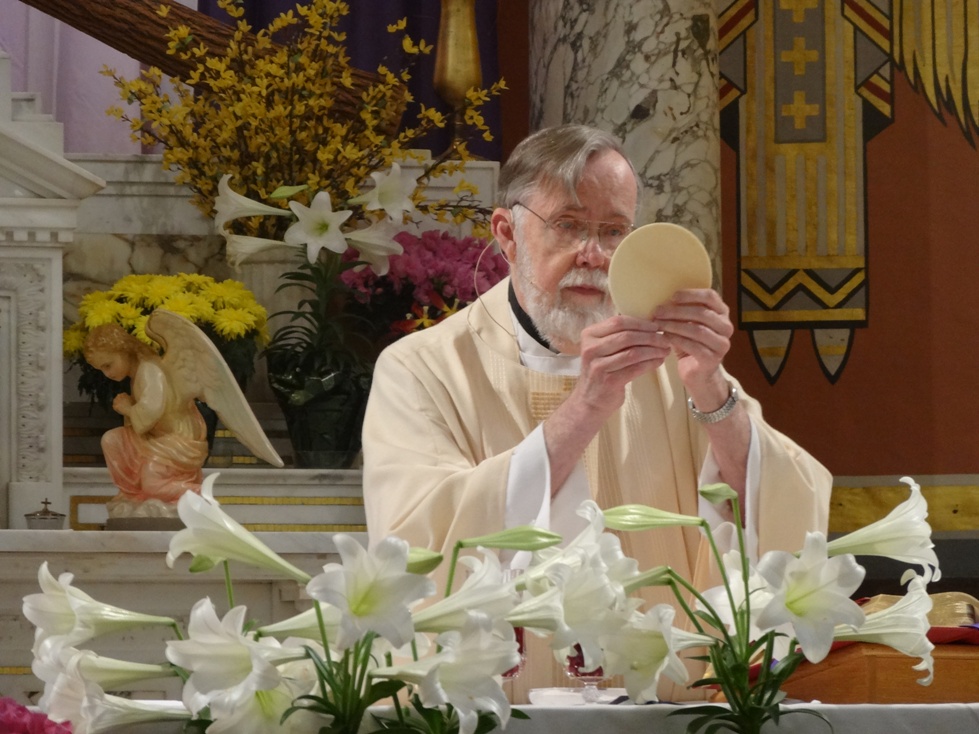
A Prayer before the Holy Sacrifice of the Mass
Let me be a holy sacrifice and unite with God in the sacrament of His greatest love.
I want to be one in Him in this act of love, where He gives Himself to me and I give myself as a sacrifice to Him. Let me be a holy sacrifice as I become one with Him in this my act of greatest love to Him.
Let me unite with Him more, that I may more deeply love Him. May I help make reparation to His adorable Heart and the heart of His Mother, Mary. With greatest love, I offer myself to You and pray that You will accept my sacrifice of greatest love. I give myself to You and unite in Your gift of Yourself to me. Come and possess my soul.
Cleanse me, strengthen me, heal me. Dear Holy Spirit act in the heart of Mary to make me more and more like Jesus.
Father, I offer this my sacrifice, myself united to Jesus in the Holy Spirit to You. Help me to love God more deeply in this act of my greatest love.
Give me the grace to grow in my knowledge, love and service of You and for this to be my greatest participation in the Mass. Give me the greatest graces to love You so deeply in this Mass, You who are so worthy of my love.
-Mass Book, December 27, 1995
A Prayer for Intimacy with the Lamb, the Bridegroom of the Soul
Oh Lamb of God, Who take away the sins of the world, come and act on my soul most intimately. I surrender myself, as I ask for the grace to let go, to just be as I exist in You and You act most intimately on my soul. You are the Initiator. I am the soul waiting Your favors as You act in me. I love You. I adore You. I worship You. Come and possess my soul with Your Divine Grace, as I experience You most intimately.
R.
It is the interior union that is
to be deeply one with Jesus –
We offer our hearts and soul to God
and He has given us a sharing
in His life in baptism –
+
Come to me, Lord, and possess my soul. Come into my heart and permeate my soul. Help me to sit in silence with You and let You work in my heart.
R.
We want our hearts to be more
and more filled by Him –
Jesus is the bridegroom of
the soul

R.
It's all about the interior life –
Preparing one's heart and soul
for heaven –
Being filled more with His life,
His grace in us –
Sin, lies, anger, pride,
drive us away from Him –
We want Good habits –
FAITH – I Believe
Hope – Eternal salvation for me
and others
LOVE – love of God, love of others
as ourselves –
Come to me Lord and possess my soul –
We have to come clean –
Repair the Breach –
Not deny and repress the sin
we keep doing – and
keep doing it –
Repressing sin and not asking
for forgiveness and mercy –
means a destructive, angry
mean spirit dominates –

R.
Get rid of the trash – don't
deny the sins – repress them
and keep sinning because the
interior life with God is
almost non-existent –
dark – full of corruption
and lies
Jesus is the WAY

R. The interior life –
like Mary –
MY SOUL DOTH MAGNIFY
THE LORD
May 13, 1993
Jesus: I want to be one in you and
you one in Me –
But satan's grip is paralyzing
and crippling –
R.
The spirit inside a man is
more and more filled with
the spirit of TRUTH –
more and more filled with
the Holy Spirit
God is love and in Him is
no darkness
"I am the Way, the
Truth and the Life"

R. Interior Life –
A deprived spirit inside –
Seeing ourselves as God
created us – beautiful –
full of promise –
We can't lie to God and others
about the wrongs we
have done –
We have to repair the
breach –
Tell the truth –
Adjust our 'stinkin - thinkin' –
The truth is God has a
big plan for our hearts
and souls –
It's a lie to tell ourselves
our life is meaningless to
God and hold onto lies
about our sins
Tell the truth about
imperfections –
die to our sins –
make amends –
Come to me, Lord, and possess my soul. Come into my heart and permeate my soul. Help me to sit in silence with You and let You work in my heart.
R.
Pride says – I need nobody –
then listens to satan's
lies –
Pride denies the sin –
I put myself before God
1. I, the Lord, am your God. You shall not have other gods besides me.
R.
We want healing in BODY –
MIND and SOUL –
Constant stress from our
own dislike of ourselves –
is stress –
dragging us down –
It's a lie –
God loves us so much –
We need Our Lady –
We need the Holy Spirit
We need to tell God we
are sorry and come clean of
our sins –
God loves us
SO Much –
Clean our souls –
God made us to be
happy and bring His truth
to the world –
Our happiness comes from
INSIDE – from our interior
life – with God – living in
the truth –
There are so many divorces
because people believe others
are the source of our happiness –
The deep union with God inside –
Love of God and neighbor as
ourselves is what brings
happiness –
We were taught, most of us, by
our parents about life –
or caretakers –
We grew up with many false
assumptions, sibling rivalry,
imperfect unhappy caretakers –
God is perfect – We were
created in the image and likeness
of God –
We have to die to our
imperfections –
27 Years Ago
October 5, 1992 - 3:30am
R. Dear Jesus, Give me Your hand to write this book for you. I am your servant. I want to be Your hand to this world. If you, Lord Jesus, would write a book, what would you say?
Jesus: My dear children,
Today I come to deliver a message to each of you. I want to tell you of each person's dignity, of their beauty and their self-worth. Each child is, oh, so uniquely precious to My Most Sacred Heart. Each child is full of the talents I have given to them. Each person is divinely created by God and given all these gifts to be happy and love one another.
The problem comes when you feel you will be left out. That you will be left by another who has trodden on you and will do it again. I see you all as My most precious children. I watch your every move and know all pain and anguish in your heart. My Heart aches, you have insecure feelings about yourself. I came to this earth I died for you. I felt cold, hungry, lonely on this earth. You need not worry that no one knows the pain and anguish in your heart. God created you with such special gifts and talents. It is important for you to raise above your wound and forgive those who hurt you.
You need only turn your will and your life over to Me and I will guide you in all your ways. I have all the Power. Many are not of My ways. The key to life is to recognize your faults, but still know you are this precious gift of My Father a gift to this world. This world is in need of your strength. Running yourself down, blaming others hurting them can cause you misery and pain. At this very moment, you are the precious creation of God!! You must operate with Me in your heart.
You need not run yourself down. I am with you every day guiding your ways, lest your foot stumble and you lose your way. You will not wander far from your path if every day you keep bringing your focus back to Me. If you dare let Me be at the helm, if you dare to really let Me run your life, I will do with you such wonders that you yourself would be amazed. But you will know with such ease when you did these things that you did not do them alone. You will know My power, moving the mountain, My power chipping at the stone, My power working on your hardest problem and you will be set free.
Oh yes, you will be set free and know a serenity that only comes from letting go and letting Me run your life. To you, My child, I have given all that is good. I made you My holy soldier, My warrior in a world of pain and hatred. You are the light that shines in the darkness, you are the coat to a cold child, you are the smile that warms a troubled and lonely heart. You are the comfort for everyone you meet, because My most precious Heart powers you, smiles through you, understands and loves through you.
Love your fellows for Me. There are so many troubled hearts that need to know My love. I can love through you if you let Me, I can be their friend through you if you let Me. I am He who comforts you and you are he who comforts them. My power is endless, it never runs out, there is not a power failure EVER. In your darkest hour, My light shines in the darkness and I say to you, "Oh blessed of My Father, look at yourself with awe, you are My creation, you are indeed so precious to Me, you are My light to this world, you are My hands and My feet and most of all My Heart."
Oh, you are My loving Heart, to those who are bowed down, to those who are lost in the darkness, you carry My smile and wear My armor in a world that is trying to tear one another down with hate and ugliness. There is gentleness, there is love, there is hope in you, if you open yourself up to Me. Be My knight to the world, wear My armor. I am your God and I will protect you from the darkness. Plug into My power, be not afraid, I go before you always and you can rest in My arms when you feel weary. You can put your head in My lap and weep, you will know, I am truly with you and you are My light to this world. I created you so special - to cast out fear in the darkness, to clothe the naked, to give hope to the oppressed, to be as I live in you and love through you and you are My smile and I touch My hurting ones through your love.
You are he who loves this world. You must stay plugged into My power-source. This world is hungry for My love. It needs My love, I give to them through you. I am your God and I made you as a gift to the world. You are filled.
Focus on Me and your life will be abundant and whole, joy in suffering, freedom — but you can take the knocks because you will know you do not go it alone, but with Me. I love you My precious child.
end of October 5, 1992
Jesus –
I am light –
I am truth –
I want to dwell in your
heart –
I am LOVE
Given
October 29, 2016
R.
Please spread blessed holy water
(You can also mix Jesus and Mary water
with your blessed Holy Water if you have it.)
in your yard, around your house,
in the state you live in.
And ask God to bless your state
Ask God to bless the United States
Pray all prayers through the intercession of
Our Lady of CLEAR – WATER.
Ask the Lady of CLEAR - WATER
to help with the blessed water.
Mary has appeared to me for 22 years,
in Ohio and Florida.
Give
the gift that Counts

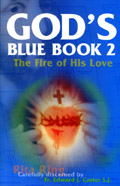
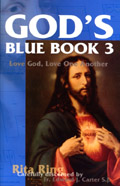
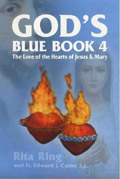
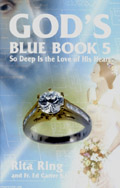
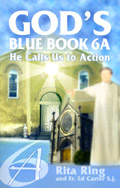
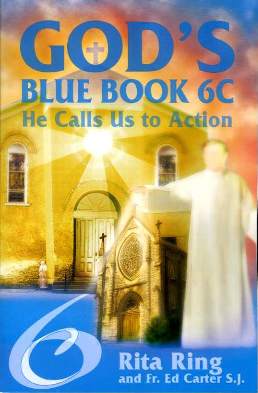
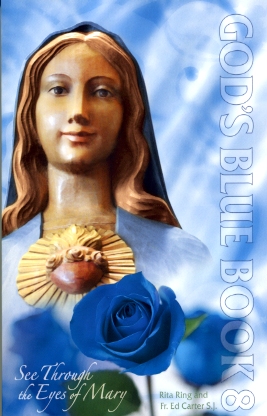
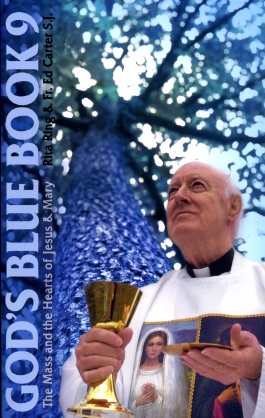
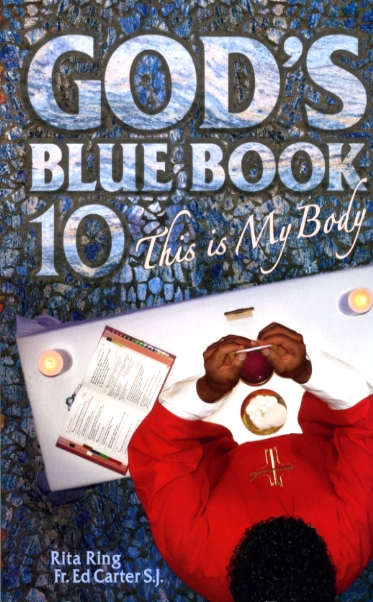

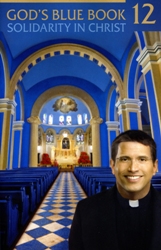
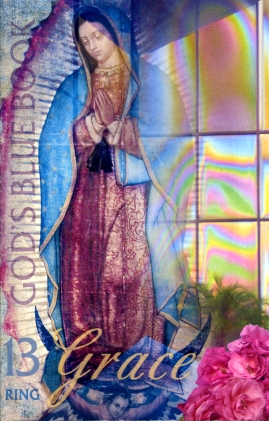
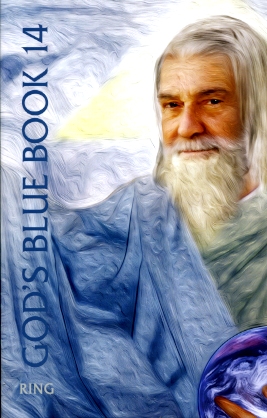
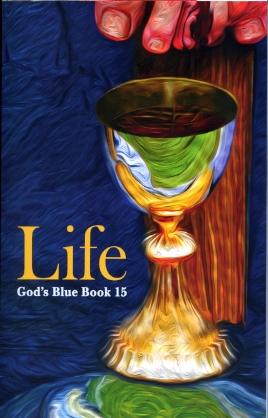
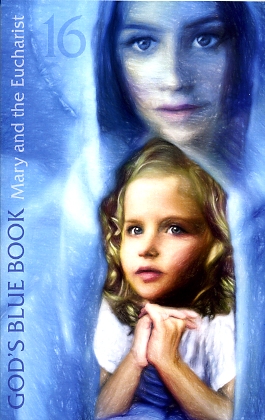

God's Blue Books - Love Letters from Jesus
Blue Books 1 & 2 - $4 each
Blue Book 3 - $3
Blue Books 4 & 5 - $2 each
Blue Books 6A, 6B, 6C, 7, 8, 9, 10, 11, 12 & 13 - $3 each
Blue Books 14, 15, 16 & 17 - $5 each
| Rita Ring | ||||

|
|
Mass Book,
by Rita Ring: Many of the entries in the Priestly Newsletter
Volume II from a spiritual journal came from this book.
These entries |
|
|
|
|
||||

|
|
Rosary Meditations
for Parents and Children,
by Rita Ring, Short Meditations for both
parents and children to be used when
praying the |
|
|
|
|
||||

|
|
God's Blue Book I by Rita Ring. Open Anywhere This book will change your life. These are beautiful love letters to us from Jesus. A million books have been printed and circulated. Jesus loves us so much He wants a personal relationship with us He wants us to go to the Eucharist and be with Him before the tabernacle. $10 |
|
|
|
|
||||

|
|
God's Blue Book II by Rita Ring. Letters from Jesus about His on fire love Jesus wants this great intimacy with us On fire love Personal love letters from Jesus about the love of His Heart A book on surrender Fr. Carter said! $10 |
|
|
|
|
||||

|
|
God's Blue Book III by Rita Ring. Fr. Carter's favorite book It is about loving and forgiving each other Being pure in heart A book for unity in family, community, in life!! $10 |
|
|
|
|
||||

|
|
God's Blue Book IV by Rita Ring. This book is about the love Jesus has for Mary and Mary has for Jesus and Jesus and Mary have for us It is truly the Love of the Two Hearts. Mary appeared every day at the Holy Spirit Center Fr. Carter was there. Mary's first apparition July 5, 1994. $5 |
|
|
|
|
||||

|
|
God's Blue Book V by Rita Ring. Jesus wants to be the bridegroom of our soul He is our beloved Jesus tells us about pure love how we are to be pure of heart and love God and love others. It is a must, to hear about love from Jesus Jesus is love $5 |
|
|
|
|
||||

|
|
God's Blue Book 6A by Rita Ring. Rosaries from Their Hearts during apparitions. Jesus and Mary appeared every day and I received rosaries from Them and They were transcribed from a tape. Also messages of love from Jesus on days of January, 1995 About Baptism writings from Fr. Carter and the Scriptures. $10 |
|
|
|
|
||||

|
|
God's Blue Book 6B by Rita Ring. Jesus and Mary appeared every day in February, 1995 So beautiful transcribed from a tape the Stations, 7 Sorrows, prayers in the Prayer Manual, the Holy Spirit Novena Book and the Song Book. Pure love loving and forgiving a book about Jesus' love, baptism, grace and Fr. Carter's Newsletter. $10 |
|
|
|
|
||||

|
|
|
|
|
|
|
||||

|
|
|
|
|
|
|
||||

|
|
|
|
|
|
|
||||

|
|
|
|
|
|
|
||||

|
|
|
|
|
|
|
||||

|
|
|
|
|
|
|
||||

|
|
|
|
|
|
|
||||

|
|
|
|
|
|
|
||||

|
|
|
|
|
|
|
||||

|
|
|
|
|
|
|
||||

|
|
|
|
|
|
|
||||

|
|
Apostles Manual. About the Movement — the structure of the Movement All Ministries — from the time 3 months before Mary appeared in Clearwater and 3 months after. Rosaries of the 13ths, Fr. Carter's Newsletters. Messages from God the Father Reaching the priests, the Church, the schools and the world. $20 |
|
|
|
|
||||

|
|
Rosaries from the Hearts of Jesus and Mary Book 1. Mary appeared in Clearwater December 17, 1996 in rainbow color and these rosaries left the printer the same day from Apparitions of Jesus and Mary transcribed from a tape. $10 |
|
|
|
|
||||

|
|
Rosaries from the Hearts of Jesus and Mary Book 2. This is a book of so many rosaries — transcribed from a tape. So many beautiful rosaries. pages $12 |
|
|
|
|
||||

|
|
Messages for the Elderly, Ill and Homebound. This is a big book of loving messages for nursing home people and homebound from Jesus and Mary Their lives are so important united to the Mass offering up their suffering, their lives for the souls of this earth. $10 |
|
|
|
|
||||

|
|
Short Rosary Meditations for the Elderly, Ill and Homebound. This book is so important with pictures they can open it and lay it on their laps and pray the rosary. $10 |
|
|
|
|
||||

|
|
Songs from Jesus Songbook. These loving songs were given from Jesus. So beautiful Love Songs from Jesus of His love — helping us have pure and loving hearts. $3 |
|
|
|
|
||||

|
|
|
|
|
|
|
|
|
||||

|
|
|
|
|
|
|
||||

|
|
Color the Lives of Jesus and Mary. Volumes 1 through 7. Coloring books and meditations for grade school children and others on the mysteries of the rosary — really good. $5 each. |
|
|
|
|
||||

|
|
|
|
|
|
|
||||

|
|
|
|
|
|
|
||||

|
|
|
|
|
|
|
||||

|
|
|
|
|
|
|
||||

|
|
Color the Lives of Jesus and Mary. Volumes 6 through 7. Coloring books and meditations for grade school children and others on the mysteries of the rosary — really good. $5 each. |
|
|
|
|
||||

|
|
|
|
|
|
|
|
|
|
|
||||

|
|
|
|
|
|
|
||||

|
|
|
|
|
|
|
||||

|
|
|
|
|
|
|
||||

|
|
|
|
|
|
|
|||

|
|
|
|
| Fr. Joe Robinson |

|
|
||||

|
|
Guiding Light — The Word Alive in Our Hearts. — Cycle B for 2017/2018 $10.00 |
|
|
|
|
||||
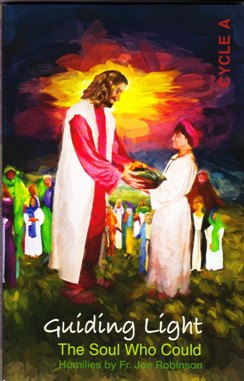
|
|
Guiding Light — The Soul Who Could. — Cycle A for 2016/2017 $10.00 |
|
|
|
|
||||

|
|
|
|
|
|
|
||||

|
|
|
|
|
|
|
||||

|
|
|
|
|
|
|
||||

|
|
|
|
|
|
|
||||

|
|
Guiding Light homily series — Reflect on the Word — Cycle B The Word leaves an impression on our souls. In my thoughts and reflections are born a more tangible understanding of these eternal concepts presented in the Gospels and the readings. Anyone can read a sentence, but not anyone can absorb it's true meaning. Truth, in this day and age, is almost a matter of opinion or individual entitlement. We believe that Christ's truth is our Roman Catholic Church. We, as priests, champion it's teachings; we are ambassadors for the Pope and Christ to those faces looking at us. We are the light by which our congregation reads to reflect upon real truth and we do it hand in hand. $15 |
|
|
|
|
||||

|
|
Guiding Light homily series — Steadfast to the Son — Cycle A The sunflower is a great example of how we should be steadfastly guided by light. What a powerful thought that this exceptional plant is not stuck in one pose day in and day out, yet adaptable and magnetized to the sun. We feel the same about our Son. Our heads turns to face Christ as each day presents its challenges to find light. We join together like plants in a field and soak up the Son through the pulpit. We are a warm circle of strength using the wind of our breath to carry our priests' words, Christ's words, to new rich soil. $15 |
|
|
|
|
||||

|
|
Guiding Light — Focusing on the Word — Cycle B At times we may feel that our path to Christ is a bit "out of focus". Like the disciples in the Book of Mark, this ordinary life clouds our vision of Christ's Divinity. We may doubt the practicality or possibility of applying His teachings and example to our modern life. Cycle B's homilies are a "guiding light" to help us realize Jesus' Messianic greatness and His promise of better things to come. $15 |
|
|
|
|
||||

|
|
Guiding Light — Feed My Soul — Cycle C In a world rapidly advancing and encouraging personal gain, we are faced with modern problems. There is a challenge to find time in our busy schedules for Sunday Mass or a family meal. We are able to research, shop, bank and even work without hearing one human voice. It is no wonder that we may often feel disconnected and famished at our week's end. In Fr. Joe's third book of homilies from Cycle C, we are reminded of the charity that Christ intended us to show each other. We have a calling to turn the other cheek and be the Good Samaritan to others. We are rewarded with the Father's kingdom and love when we are not worthy. We are not left alone or hungry. $15 |
|
|
| Fr. Edward J. Carter S.J. |
Here are all the products in this category:
Books written by the founder of Shepherds of Christ Ministries
|
|
||||

|
|
|
|
|
|
|
||||

|
|
Response to God’s Love by Fr. Edward J. Carter, S.J. In this book Fr. Carter speaks of God as the ultimate mystery. We can meditate on the interior life of the Trinity. Fr. Carter tells us about our uniqueness in the Father's Plan for us, how the individual Christian, the Church and the world are in the state of becoming. Imprimatur. $10 |
|
|
|
|
||||

|
|
Shepherds of Christ — Selected Writings on Spirituality for all People as Published in Shepherds of Christ Newsletter for Priests. Contains 12 issues of the newsletter from July/August 1994 to May/June 1996. $15 |
|
|
|
|
||||

|
|
Shepherds of Christ — Volume 2: by Fr. Edward J. Carter, S.J. Contains issues 13—29 of the newsletter (September/October 1996 — Issue 5, 1999) $15 |
|
|
|
|
||||

|
|
Shepherds of Christ — Volume 3 by Fr. Edward J. Carter, S.J. Contains Newsletter Issues 1 through 4 of 2000 including Fr. Carter’s tremendous Overview of the Spiritual Life $10 |
|
|
|
|
||||

|
|
Tell My People. Messages from Jesus and Mary (As given to Fr. Edward Carter, S.J.) One of Fr. Edward Carter, S.J.'s Synopsis of the Spiritual Life From Jesus to Fr. Carter "On Holy Saturday, 1994, Jesus told me that on the following day, Easter, I would also begin to receive messages for others. Our Lord also told me that some of these were eventually to be published in a book and here is that book." $10 |
|
|
|
|
||||

|
|
Spirituality Handbook. Fr. Edward Carter, S.J. did 3 synopsis of the spiritual life. The Spirituality Handbook, the Priestly Newsletter 20he Tell My People book. The way of spiritual life proposed to the members of Shepherds of Christ Associates is centered in consecration to the Hearts of Jesus and Mary. All aspects of the spiritual life discussed below should be viewed as means to help members develop their lives in consecration to Christ, the Sacred Heart, and to Mary, the Immaculate Heart. $3 |
|
|
|
|
||||

|
|
The Spirituality of Fatima by Fr. Edward J. Carter, S.J. The Fatima apparitions and messages received official Church approval in 1930. In giving her official approval to the Fatima event, the Church tells us that what took place at Fatima involving the three young visionaries is worthy of our belief. $5 |
|
|
|
|
||||

|
|
|
|
|
|
|
|||

|
|
Priestly Newsletter — 2000 #1 — CD. — Christ is Our Strength — Fr. Edward Carter, S.J. read it the year he died. It is so beautiful. "This brief passage contains one of the greatest lessons of the spiritual life. As we progress along our spiritual journey, we become increasingly aware of how weak we are in our—selves, but how strong we are in Christ. To experience our weakness involves suffering. The degree and kind of suffering can vary. The suffering can include the experience of the classical dark night of the spirit as described by St. John of the Cross. One of the main purposes of the dark night is to make a person keenly aware of his or her helplessness without God." quote by Fr. Carter from the newsletter $10 |
|
|
Shepherds of Christ Holy Spirit Novena Holy Spirit Novena Booklet. In four languages with the Imprimatur with 18 scripture readings for two complete novenas – this very powerful Holy Spirit Novena has prayers for prayers for Protection by the Blood of Jesus, Healing, Strength and Light, To Be One with God, Father, Son and Holy Spirit, One with Jesus, To Dwell in the Hearts of Jesus and Mary, Prayer for the Holy Spirit and His Gifts, and the Word Alive in Our Hearts. All these prayers take about 10 minutes daily recited out loud. $1
|
|
|
Shepherds of Christ Holy Spirit Novena CD
|
|
|
Shepherds of Christ Prayer
Manual Shepherds of Christ Prayer Manual. The Shepherds of Christ has prayer chapters all over the world praying for the priests, the Church and the world. These prayers that Father Carter compiled in the summer of 1994 began this worldwide network of prayer. Currently the prayers are in eight languages with the Church’s Imprimatur. We have prayed daily for the priests, the Church, and the world since 1994. Associates are called to join prayer Chapters and help us circulate the newsletter centered on spreading devotion to the Sacred Heart and Immaculate Heart and helping to renew the Church through greater holiness. Please form a Prayer Chapter & order a Prayer Manual. |
|
Statues/Religious Items |
Statues, Crucifixes, and Religious Artwork
These items are very special additions to your home or place of worship.
|
|
|
|
|
|
|
|
|
|
Special 12" Sacred Heart or Immaculate
Heart Statues with Glass
|
|
|
Special 11" Our Lady of Fatima/Clearwater
Statue with Glass
White or Ivory gown with gold trim. $ 60.00 each plus shipping |
|
|
|
|
|
Red
Crystal Rosary
|
|
|
Clear Crystal Rosary
|
Given March 21, 2014
R. Pray for These Things
1) Pray for the Pope & hierarchy to help us start prayer chapters.
2) Pray for Dan, Sally Jo, Richard, Carol, Margaret, Sue,
Jack, Jean, Amanda, Matthew, Special intentions.
3) Pray for the priests, the Church and the world!
4) Pray for the spread of prayer chapters,
also for the spread of priests doing prayer chapters.
5) Pray for the spread of Blue Books.
6) People going to Florida and China.
7) Vocations to all 7 categories.
8) Pray for spread of Consecration and Rosary.
9) Pray for pope helping us.
10) Pray for Jeff - sales & health. Pray for Nick.
11) Blue Book 18 and cover and all involved.
For our Publisher and all involved
12) All intentions on my list, Jerry's list.
13) Priests getting Fr. Joe's book.
14) Pray for Fr. Joe's new book, cover & funds for printing & postage.
15) Donors and members and their families.
16) Healing of the Family tree.
17) Dan & Melanie, Catherine & mom, Gary, Mary Jo,
Jim & statues, Fr. Ken, Monsignor, Kerry, Tom & wife.
18) All who asked us to pray for them.
19) All we promised to pray for.
20) Rita, John, Doris, Sheila, Jerry, Regina, Sanja,
Betty, Sophie, Lisa, Eileen, Fr. Mike, Louie, Laverne,
2 Dons, Mary Ellen, Fr. Joe, all priests helping us,
Ed, Jimmy, Steve, a special couple, Rosie & all involved.
21) 2 babies and moms.
22) Funds and insurance.
23) Jerry's garage.
24) In thanksgiving for gifts, graces, & blessings received.
25) Spread the Blood of Jesus on all of us here.
26) Consecrate all hearts.
27) Cast the devil out of all of us here and all in Movement.
Shepherds of Christ Ministries
P.O. Box 627 China, Indiana 47250
Telephone: (toll free) 1-888-211-3041 or (812) 273-8405
FAX: (812) 273-3182
Copyright © 2014 Shepherds of Christ.
Rights for non–commercial reproduction granted:
May be copied in its entirety, but neither re–typed nor edited.
Translations are welcome but they must be reviewed for moral and
theological accuracy by a source approved by Shepherds of Christ Ministries
before any distribution takes place. Please contact us for more information.